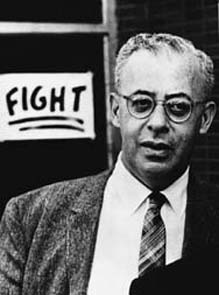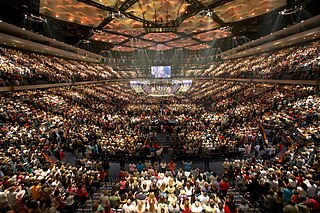
The United Farm Workers of America, or more commonly just United Farm Workers (UFW), is a labor union for farmworkers in the United States. It originated from the merger of two workers' rights organizations, the Agricultural Workers Organizing Committee (AWOC) led by organizer Larry Itliong, and the National Farm Workers Association (NFWA) led by César Chávez and Dolores Huerta. They became allied and transformed from workers' rights organizations into a union as a result of a series of strikes in 1965, when the mostly Filipino farmworkers of the AWOC in Delano, California initiated a grape strike, and the NFWA went on strike in support. As a result of the commonality in goals and methods, the NFWA and the AWOC formed the United Farm Workers Organizing Committee on August 22, 1966. This organization was accepted into the AFL-CIO in 1972 and changed its name to the United Farm workers Union.
Thomas A. "Tom" Gaudette (1923–1998) was a community organizer who worked in the Austin neighborhood of Chicago. Originally a businessman, Gaudette became interested in neighborhood organizing through his Catholic Church activism. Gaudette helped form a neighborhood group, along the lines of those organized by Saul Alinsky, on the far West Side of Chicago called Organization for a Better Austin. OBA was concerned with poor schools and neighborhood decline.

New City is one of Chicago's 77 official community areas, located on the southwest side of the city in the South Side district. It contains the neighborhoods of Canaryville and Back of the Yards.

Jarrett Tomás Barrios is the chief executive officer of the American Red Cross Los Angeles Region, a former politician and activist. Prior to this, he served at the CEO of the American Red Cross of Massachusetts. Barrios served as a member of both the Massachusetts House of Representatives and the Massachusetts Senate and became the first Latino and first openly gay man elected to the Massachusetts Senate. He subsequently served as president of the Blue Cross and Blue Shield of Massachusetts Foundation and, later, of the Gay & Lesbian Alliance Against Defamation (GLAAD).
Community organization covers a series of activities at the community level aimed at bringing about desired improvement in the social well-being of individuals, groups, organizations, and neighborhoods.

Rules for Radicals: A Pragmatic Primer for Realistic Radicals is a 1971 book by community activist and writer Saul D. Alinsky about how to successfully run a movement for change. It was the last book that Alinsky wrote and was published shortly before his death in 1972. His goal for the Rules for Radicals was to create a guide for future community organizers, to use in uniting low-income communities, or "Have-Nots", in order for them to gain social, political, legal, and economic power. Within it, Alinsky compiled the lessons he had learned throughout his experiences of community organizing from 1939–1971 and targeted these lessons at the current, new generation of radicals.
Communities Organized for Public Service (COPS) is a coalition of non-partisan, grassroots community pressure groups based in San Antonio, Texas. It is an affiliate of the Industrial Areas Foundation (IAF), a group dedicated to grassroots community organizing that was developed by Saul Alinsky in Chicago during the 1930s. Founded in 1974, COPS’ mission is to secure specific, concrete standard of living improvements for neighborhoods traditionally neglected by city leaders through relational organizing.
Community organizing describes a wide variety of efforts to empower residents in a local area to participate in civic life or governmental affairs. Most efforts that claim this label operate in low-income or middle-income areas, and have adopted at least some of the tactics and organizing techniques pioneered by Saul Alinsky and his Industrial Areas Foundation. Other organizations in this tradition include PICO National Network, Gamaliel Foundation, and Direct Action and Research Training Center (DART).

The Community Service Organization was an important California Latino civil rights organization, most famous for training Cesar Chavez and Dolores Huerta. It was founded in 1947 by Fred Ross, Antonio Rios and Edward Roybal and was a source of political support for Roybal during his long political career. Ross had been hired by Saul Alinsky and was employed by his Industrial Areas Foundation.
The National Volunteer Caregiving Network is a network of interfaith, volunteer caregiving service providers with hundreds of locations throughout the United States. It was initiated by the Robert Wood Johnson Foundation, a national charity dedicated to improving the health and health care of Americans, headquartered in Princeton, New Jersey. The purpose was to provide start-up monies to create community volunteer programs across the country to serve people who are isolated or homebound due to long-term health conditions as the result of old age and/or disability. The initial grants were made in 1984. Over the course of twenty years, more than 1,500 local programs were funded and many continue to serve people with long-term health conditions.

Iowa Citizens for Community Improvement is a membership-based grassroots organization dedicated to community organizing in the state of Iowa.
Gamaliel Foundation provides training and consultation and develops national strategy for its affiliated congregation-based community organizations. As of 2013, Gamaliel has 45 affiliates in 17 U.S. states, the United Kingdom, and South Africa, and claims to represent over a million people.

The Health Initiative of the Americas is a Latino program focusing mainly on migrant and immigrant health issues. It is part of the School of Public Health at the University of California, Berkeley.
Northeast Ohio Community and Neighborhood Data for Organizing is an online database built and managed by the Center on Urban Poverty and Community Development, under the direction of Co-director Claudia Coulton at the Mandel School of Applied Social Sciences in Cleveland, Ohio. The database was started in 1988 as CANDO and now houses data for a 17-county region centering on the Greater Cleveland, and the Cuyahoga County area in Northeast Ohio. This data is varied in its completeness for geographies, but contains crime data for the City of Cleveland, food stamp and TANF usage counts, social indicators, economic indicators, and a restricted-use section for properties in the foreclosure, sheriff's sale and Real Estate Owned (REO) process. These data are used by neighborhood associations, Non-profit organizations, governmental agencies such as the Cuyahoga County Planning Commission, and Community Development Corporations such as Slavic Village Development, to plan activities, or to improve neighborhoods, or to propose social programing, and to combat the advance of urban decay accelerated by the 2010 United States foreclosure crisis.

Samuel M. Chu currently directs the national advocacy and community organizing for MAZON: A Jewish Response to Hunger., leading local and regional campaigns around issues of food insecurity and access in various states. He is a fellow at the Center for Religion and Civic Culture at University of Southern California, where he engages in research, writing and teaching around community organizing, public leadership, and the role of religious institutions in social change.
Pilsen Neighbors Community Council is a grassroots organization that was founded in 1954. Its organizing efforts focus on civil rights issues such as education, health care, housing and immigration reform. They are responsible for ground breaking events in the Pilsen neighborhood of Chicago, Illinois, in the United States. PNCC was the lead organization in helping build Alivio Medical Center, that is now a very important institution in the Pilsen neighborhood. They are also instrumental in the building of Benito Juarez High School.

Occupy Homes or Occupy Our Homes is part of the Occupy movement which attempts to prevent the foreclosure of people's homes. Protesters delay foreclosures by camping out on the foreclosed property. They also stage protests at the banks responsible for the ongoing foreclosure crisis, sometimes blocking their entrances. It has been compared to the direct action taken by people to prevent home foreclosures during the Great Depression in the United States.















